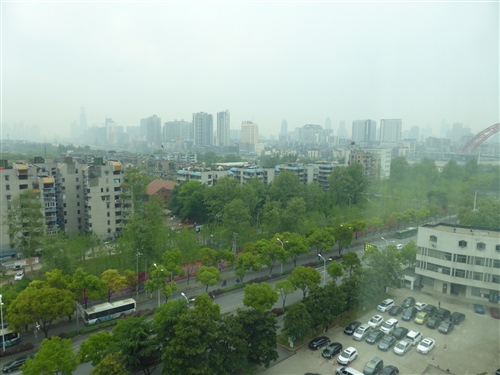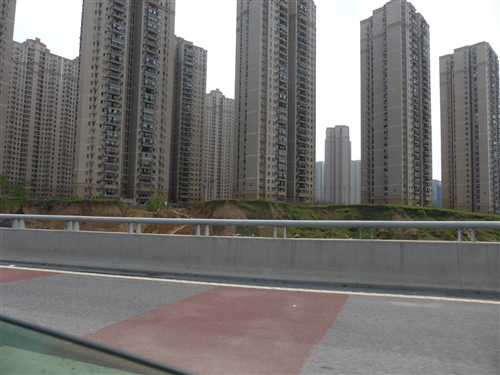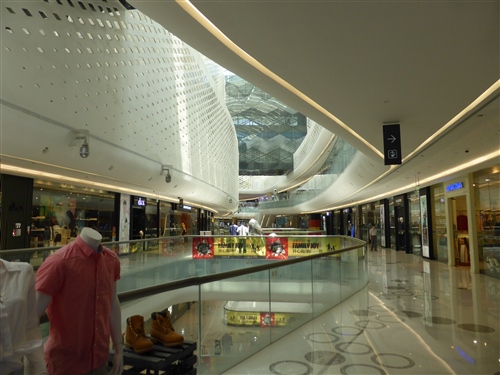Pag 1
My obstinate and willful travel to China (Wuhan)
Made from 15 april 2015

I confess: a typical tourist, I will never be. Not that I'm not interested in other cultu-res, on the contrary: in many ways, I was already on a very early age fascinated by the Chinese culture. Yin-Yang, traditional oriental medicine, acupuncture, kung fu and martial films, the philosophy of Taoism, the I Ching, the Chinese food, even a "trip" to Japan with macrobiotics and aikido, I've all tasted it, and dipped myself under in it. China was an excellent travel destination. Nevertheless, I must confess: the real reason to go to China,was there to meet a Chinese woman, with whom I had been 7 month long in communication, mailed, phoned, .. ...... So Wuhan was my destiny, for the simple reason that she lives there.
The woman I unfortunately did not get to see, but Wuhan even more: a "world city" in Central South China, hardly known, but with 10 million inhabitants, as much in one city as there are living people in whole Belgium. Wuhan is typically "Chinese", because created by and for the Chinese, with not so very much touristical attractions and thus with the consequence that there are very few people who can understand English, without taking in considertion that they could speak English. I thought of being clever to have written the name of my hotel on a card, that I could show to a taxi driver at the airport. No way: they can not even "read" English letters. When I went into a bank with my credit card to get Chinese yuan, the bank clerk studied my passport so deeply, that he could know it at least from heart, because he was more than 15 minutes busy with trying to decrypt it. It did not help because in the end, he did not trust the affair. I could only use my credit card at the hotel and in the temples of consumption.
Let us not be childish: China is only just in name a communistic state; in reality, China has become the USA of the East. With ALL the features and evils that entails: the time when the streets were flooded with cyclists are from long only a memory. King Car dominates the streets, with hundred thousand cars, taxis, busses and trucks honking through the complicated course of three districts, with criss therefore cyclists and pedestrians who venture to the danger of their lives that flow. The result: an amazing layer of a toxic, dirty mist that hung like a blanket over the city perma-nently. Let us be honest: China burps economicly well. One can see that on the relentless building boom: all districts are under construction or in the pipeline; high flats rise in fast speed like mushrooms, and the roads are partly used and partly newly constructed at the same time, like anywhere in Asia. But the question is: is that new welfare for everyone or equitable and fairly divided, or does that money dissapear in the pockets of a new middle class that serves as example and target for the whole population?

Everywhere Temples in honor of this economic progress are planted down: banks with giant columns of 5 meters high and 4 meters high entrance doors; supermarkets with aisles of 20 meters wide and 12 stories high, where to obtain all global brands all over the world. Giant billboards on the street are all day spouting their slogans; and all the worldconcerns that one can find elsewhere in the world, are also not missing in China: Pizahut, MacDonalds, Wall Market, and the entire itty cried. Whether this benefit the modal Chinese, I have my serious doubts, because a good average salary is still only amounts to around 3.000 yuan or 430 euros a month.
The emergence of a wealthy middle class that participates to the consumption and are driving larger vehicles, suggests like everywhere else in the world, that this may be YOUR part, at condition you will work hard enough. When I was on a Sunday in the park walking, and heard a group of Chinese chanting loudly, I asked my guide: "What are they really doing there?" "Oh, that his comrades who work together on a factory or business, and encourage each other to do better: if we work harder, we will achieve our goals and realize our dreams." Oh boy: capitalistic slogans instead of communistic; and in the West we known from long that these are blatant lies. The capitalistic system and the consumtion systhem do NOT work for people, but for their own purposes: making profits at the expense of the people. In China, this is expressed as follows: the broad roads and major shopping areas are built by breaking down outdated neighborhoods. They are used as hiding screens for impoverished neighborhoods, where Chinese people go as since traditionally their normal course. Where WHOLE neighborhoods are leveled with the ground, a kind futuristic night-mare of a forest of high-rise buildings is created.
Survive in this busy, overcrowded, noisy, polluted and stressed environment is no laughing matter. There are no amenities, and everything beyond the day-day business is quite expensive: for example, doctors are not there. If you fall sick you should go to the hospital, and that costs 300 yuan, so 10% of your monthly income. Chinese are also only go to hospital if they are really or seriously ill. In Wuhan there was also a Center for Traditional herbal medicine, but only one (older) minority is going there. The "old" culture is disseaparing in an extremely fast pace . The Taoist and Buddhist temples has just like the churches in the West have become relics, where only a minority practice their faith. They serve mainly as attractions for tourists, and that is in the West no different. Like everywhere else in the world were "China towns" were built as "exotic" attractions, there was built a special "Western district" in Wuhan: the Han Street, one of the favourite one day excursions of the Chinese from the region . "Is it like in Europe?" asked my guide. "Yes and no," I answered her. Let us say that it was the kitch version of it, the IDEA that the Chinese have of what Europe is, with a exotic Madame Tussaud Museum included.
The contrast between the OLD China as it is sung in films and as it is glorified in the museums for the Chinese to give a national identity and solidarity, can not be sharper. My video from above, where I have put both "realities" side by side, is harrowing. I like the Chinese, but what they have made now from China, is a total fuck up. It's obviously a gigantic country with a in number s gigantic population, but if one is busy to reorganize it, it would be better to tackle it differently instead of making a uninhabitable climate of it like one does now. Life in rural areas will be totally different than in the cities, but those lasts are the epicenters from which China is evolving. That is not only in Wuhan so, but in all cities.
The gap between rural and urban, and between rich and poor is increasing rapidly, as is always the case when one adopts capitalist principles. The charm of Old China is thus slowly but surely pushed far into the background, as a sort of echo of the past. In my further report I will let ONLY speak the images for themselves: namely those aspects of China I love, and those which I do not like. Which I loved in Wuhan: the Changchun Taoist Temple, the Guiyaun Buddhist Temle, the Moshan Hill or sometimes simply called Mount Mo, the cruise on the East Lake, Wuhan Great Yu Museum, Wuhan Botanical Garden with special its little house above the water , where always a fresh breeze was blowing. All places with good chi and radiance. And under the category of "daily life": the common folk restaurants (even though the food was usually rather "oily"), the mahjong players on the streets, the evening dancing in the park on music, my tour guide who did so her best to me to make it my way, the hotel staff that kindly spoke at me with "Good morning Rudy" and made me forget for a moment that I was alone. The life of a tourist may be advantaged and easy, but it was NOT my intention to be a tourist. The difference between, I have noticed when a thick Dutch couple entered the hotel lobby and complained that they had not found a taxi. Haha, in Chinese cities still ride a MASS of taxis. How you should take one: you set yourself for an intersection or on a corner of a street, and wait for a taxi stops to let out a customer; then you simply jump into the cab (before others do haha).
But the life of the Chinese self, is not easy, especially those of the women. It is still my intention to find "my" Chinese woman, but whether it will succeed in that, I can not know at all. China's ambivalence is reflected in the issue of Chinese woman, and also in the way in which they get on with "foreigners": there may still a lot of reasons why "it" at some stage suddenly is "bouncing off". Therefore, and for the Chinese women themselves, and for the Westerners who (want to) come in contact with them, first of all my reflections on the need for an emancipation process for the Chinese woman on the following page.
